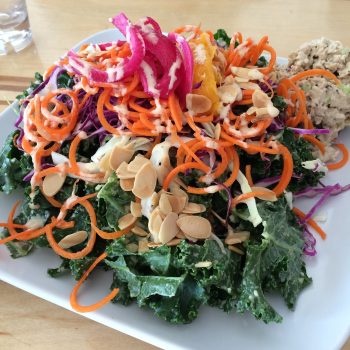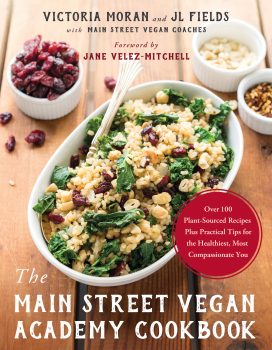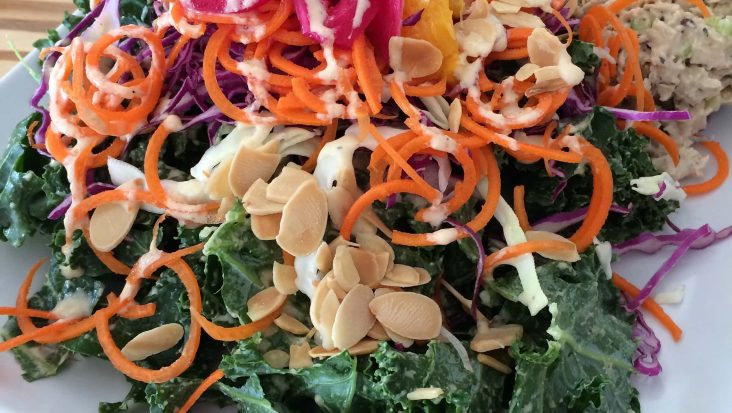There’s so much confusion out there about nutrition. Unlike any other science in which the science itself draws fact from opinion, you can find every kind of “fact” about nutrition, backed by studies which may or may not have been without bias in terms of who funded the study. Amid the morass of misinformation, these 7 recommendations rise above the fray as the gold standard for healthy eating.
- Eat plants: vegetables, fruits, whole grains, legumes, nuts and seeds. If that sounds boring,
 don’t worry: these simple foods combine to make dazzling dishes, including those that are meaty, cheesy, and otherwise reminiscent of the foods you think you’ll miss. Some experts will say “Eat mostly plants.” I recommend “Eat only plants.” A plant-exclusive diet, fortified with vitamin B12, has the most evidence behind it for helping humans live disease-free. (See How Not to Die, by Michael Greger, MD.)
don’t worry: these simple foods combine to make dazzling dishes, including those that are meaty, cheesy, and otherwise reminiscent of the foods you think you’ll miss. Some experts will say “Eat mostly plants.” I recommend “Eat only plants.” A plant-exclusive diet, fortified with vitamin B12, has the most evidence behind it for helping humans live disease-free. (See How Not to Die, by Michael Greger, MD.) - Most of the time, eat plants that haven’t been through a plant. Sometimes processed, packaged, convenience foods are a time-saving godsend. When you purchase them, read the labels to be sure they’re free from any animal products, GMO ingredients (cottonseed oil and non-organic soy or corn), high fructose corn syrup, hydrogenated or partially hydrogenated oils, or palm oil. But most of the time, choose foods that don’t even have a label because you picked them from the produce section or the bulk bins.
- Generally speaking, think in terms of whole foods, not isolated nutrients. The magic of nutrition, the way foods from the earth becomes our physical stucture, happens as a result of chemical interplays only partially understood by science. Eat a variety of colors: green, yellow, orange, purple––and when it comes to produce, even white is a color (think, cauliflower) and a variety of plant food overall. (Check out Whole: Rethinking the Science of Nutrition, by T. Colin Campbell, PhD.)
- Cook gently. In yoga, it’s said that the highest quality foods have a sattvic (balancing,
 purifying) quality, but that these same foods––fruits, vegetables, nuts, seeds, etc.––can be rendered tamasic (dulling, depressing) by improper preparation. Avoid this by eating raw what can be eaten raw (and what you can easily digest in this state) and by lightly steaming vegetables or sauteeing in a small amount of avocado or olive oil, if you use oil, and always at medium or lower heat. (For some amazing recipes using great cooking techniques, find The Main Street Vegan Academy Cookbook, by JL Fields, Victoria Moran, and Main Street Vegan Academy coaches.)
purifying) quality, but that these same foods––fruits, vegetables, nuts, seeds, etc.––can be rendered tamasic (dulling, depressing) by improper preparation. Avoid this by eating raw what can be eaten raw (and what you can easily digest in this state) and by lightly steaming vegetables or sauteeing in a small amount of avocado or olive oil, if you use oil, and always at medium or lower heat. (For some amazing recipes using great cooking techniques, find The Main Street Vegan Academy Cookbook, by JL Fields, Victoria Moran, and Main Street Vegan Academy coaches.) - Supplement judiciously. The key to a great life, or great health, is not in a plethora of brown bottles. There are a few nutrients, however, which one would do well to supplement. Vitamin B12 is essential if you’re a vegetarian or if you’re over the age of 50, regardless of your diet. Vitamin D3––it’s actually a hormone, not a vitamin––is something that a great many people lack because we’re simply not out in direct sunlight enough for the action of sunlight on our skin to make it. Unless your levels are optimal (a simple blood test can tell you), supplementing 1000 IU daily makes sense. You may also want to consider supplementing the fully formed Omega 3 fatty acids, DHA and EPA, from an algae-based source. Other nutrients to consider include iodine (unless you regularly consume either iodized salt or seaweed), vitamin K2
(unless you regular eat the Japanese soyfood, natto), and zinc (pumpkin seeds are best plant source, but you’d need to eat quite a few of them to get the RDA). I recommend Complement Essential to my clients, all Vegan and very high quality. If you’d like to check it out, go to www.lovecomplement.com, and use the discount code MAINSTREET to save 10%.
to my clients, all Vegan and very high quality. If you’d like to check it out, go to www.lovecomplement.com, and use the discount code MAINSTREET to save 10%. - Cook, and eat, in a good frame of mind. Years ago, I had a friend of the Sikh faith who told me that in her tradition, food preparation is so sacred that one is asked to pause before entering the kitchen to be sure they’re in a positive mental state before working with food. The belief is that mental attitude can be passed from the cook to the food. And we know from solid science that when food is consumed in a state of fear, anger, or upset of any kind, digestion is impaired. Cultivate uplifting conversation at the table, or if you’re dining alone, do so in the company of sunny thoughts, a lovely table setting, and good music or an inspiring audiobook. (My classic Main Street Vegan is now available in audio––here’s the link to the book on Audible.)
- Practice the other habits of healthy living. Diet isn’t everything. To live vibrantly calls for regular exercise, good sleep, excellent hydration, and some practice, meditation, for instance, to help combat the stresses of life. (Un-Do It: How Simple Lifestyle Changes Can Reverse Most Chronic Diseases, by Dean Ornish, MD, and Anne Ornish, is an excellent guide to covering all the bases.) And it’s all connected: when you’re eating well, you tend to sleep better. When you’re exercising, you’re more drawn to health-promoting foods.
 Victoria Moran is the author of Main Street Vegan, The Love-Powered Diet, Younger by the Day and ten other books. She is a certified holistic coach, vegan lifestyle coach, yoga instructor, and founder and director of Main Street Vegan Academy, training and certifying vegan lifestyle coaches and educators. Learn more about Victoria at https://victoriamoran.com, and attend her upcoming Zoom retreat, Acing Age With Ayurveda, the weekend of June 17-18, 2023: https://tinyurl.com/ageless-retreat. Use the discount code TY40 to save $40 off the fee for this weekend retreat (two full days) and 38-page illustrated PDF.
Victoria Moran is the author of Main Street Vegan, The Love-Powered Diet, Younger by the Day and ten other books. She is a certified holistic coach, vegan lifestyle coach, yoga instructor, and founder and director of Main Street Vegan Academy, training and certifying vegan lifestyle coaches and educators. Learn more about Victoria at https://victoriamoran.com, and attend her upcoming Zoom retreat, Acing Age With Ayurveda, the weekend of June 17-18, 2023: https://tinyurl.com/ageless-retreat. Use the discount code TY40 to save $40 off the fee for this weekend retreat (two full days) and 38-page illustrated PDF.

